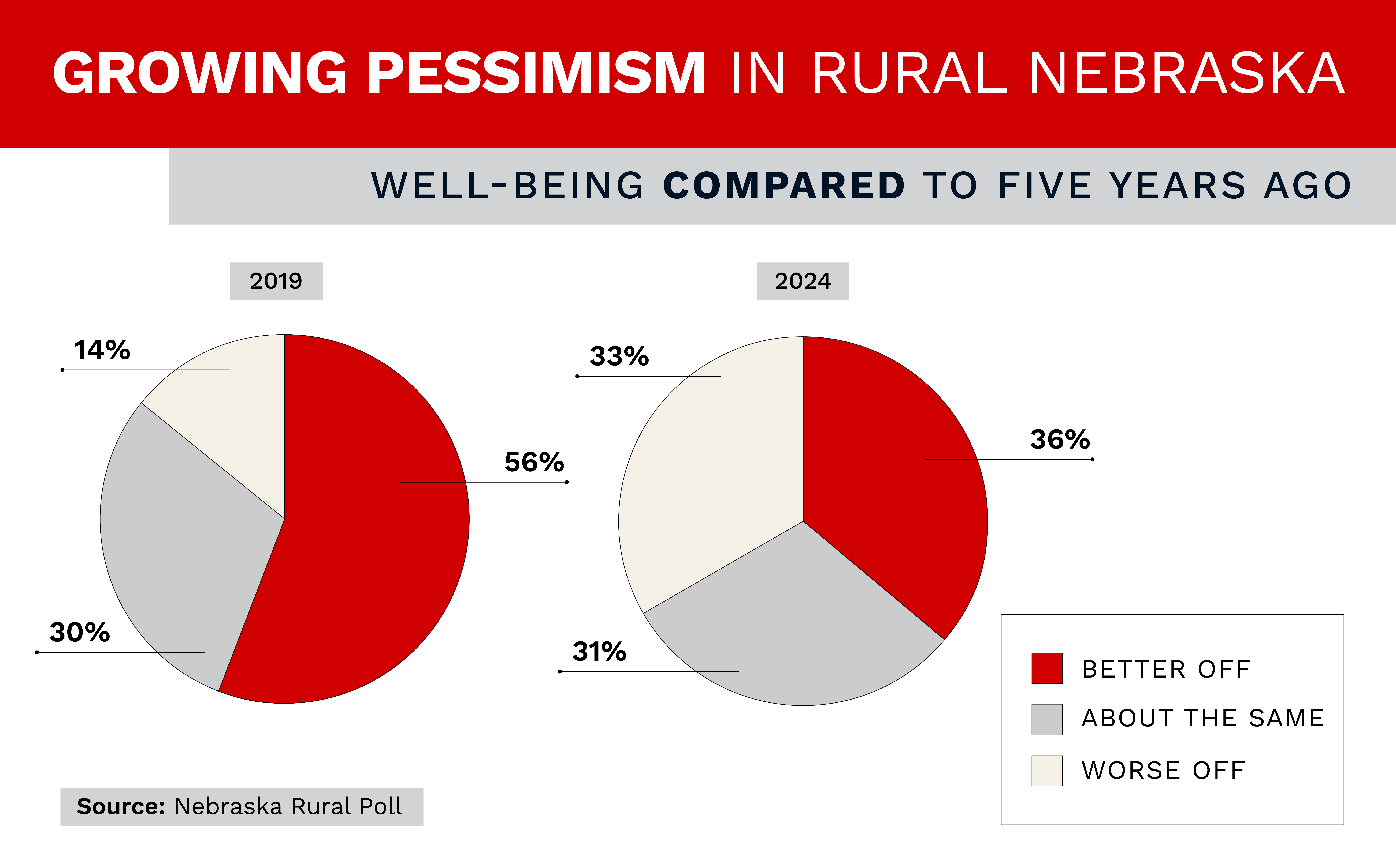
Rural Nebraskans are increasingly pessimistic about their current and future well-being, according to the 2024 Nebraska Rural Poll.
Over the past 29 years, the poll has asked respondents about their current well-being and their outlook on the future. This year, 33% of respondents indicated they are worse off than they were five years ago, the highest level across all years of the study. This increased from 27% last year.
The increase in pessimism was matched with a sharp decrease in optimism. This year, 36% of those surveyed believe they are better off compared to five years ago, down from 45% last year.
Rural Nebraskans’ optimism about the future has also trended downward over the past five years, said Becky Vogt, poll manager. This year, 34% of rural Nebraskans surveyed believe they will be better off 10 years from now. This has steadily declined from a high of 52% in 2019. The proportion saying they will be worse off in a decade was about the same as last year (26% this year and 27% last year).
The gap between respondents saying they are better off than five years ago versus worse off has narrowed considerably in the past three years. This year, the gap was within the study’s margin of error. This narrowing gap is also true of future outlook, with 34% of respondents saying they will be better off 10 years from now and 26% saying they will be worse off.

“Nationwide surveys have also shown people are still negative about the economy,” said Brad Lubben, Extension policy specialist. “While the numbers in Nebraska still show more optimism than pessimism, the downward trend is evidence of the growing concerns over the economy.
“Even as some economic numbers show improvement nationally, it can take time for consumer sentiment and confidence to return. With higher consumer prices due to higher inflation rates of the past few years and higher interest rates challenging borrowers, it will take some time for improved economic conditions to improve consumer attitudes.”
Despite the overall trends, certain groups are more likely to be optimistic about their current situation and their future, according to the Rural Poll. These include younger people, households with higher incomes and households with higher levels of education.
In addition, most rural Nebraskans surveyed describe their mental health or emotional well-being as good (51%) or excellent (27%). However, the poll showed more young people struggling:
- The youngest rural Nebraskans are least likely to report their mental health as being good or excellent (50% compared to about 80% for age 30 and older).
- Almost half of young Nebraskans (45%) rate their mental health as only fair.
- Younger Nebraskans surveyed were also more likely to agree that people are powerless to control their own lives.
The poll also asked about loneliness. A slight majority of rural Nebraskans surveyed say they hardly ever or never experience feelings of loneliness. Slightly more than half said they rarely or never experience the following: feeling isolated from others (56%), feeling that they lack companionship (55%) or feeling left out (51%).
Certain groups are more likely than others to experience feelings of loneliness. For example:
- 17% of respondents living in or near communities with populations of 10,000 or more say they often feel left out, compared to 5% of those living in or near communities with populations under 500.
- 26% of rural Nebraskans surveyed who have never married (26%) often feel left out, compared to less than 10% of married or widowed respondents.
- Nebraskans living in or near larger communities are more likely than those living in or near smaller communities to say they often feel left out.
Cheryl Burkhart-Kriesel, an Extension specialist with Rural Prosperity Nebraska, said small communities often foster a sense of connectedness.
“In smaller communities, you may see the same person at the post office, cafe or at church,” she said. “You get to know them, and they get to know you — it is just easier to feel connected.”
Policymakers, community leaders and members of the public are invited to learn more about rural Nebraskans’ perceptions of well-being during a free noon webinar Sept. 10. More details and registration are available here.
The Rural Poll is the largest annual poll gauging rural Nebraskans’ perceptions about policy and quality of life. Questionnaires were mailed to more than 5,800 households in Nebraska in late spring and summer, with 1,010 households — representing 86 of the state’s 93 counties — responding. The margin of error for the poll is plus-or-minus 3%. Rural Prosperity Nebraska conducts the poll with funding from Nebraska Extension.








